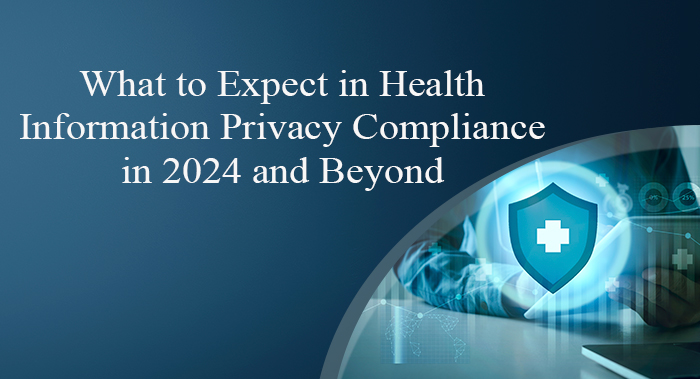
What to Expect in Health Information Privacy Compliance in 2024 and Beyond
The healthcare industry has witnessed many technological advancements focusing on improving patient data privacy and security. However, for organizations in the healthcare industry, it’s crucial to be aware of health information privacy compliance in 2024. The field undergoes significant changes, including challenges to tackle, strategies to increase compliance, and many more.
Here is the checklist that you should expect in the upcoming year. Let’s scroll down!
Basic Understanding of HIPAA Rules is Mandatory
It starts with the basic understanding of HIPAA, which has five rules. The main objective of HIPAA is to keep patient health information (PHI) confidential as it contains sensitive data. It allows patients to own their health information and use and share it properly with their consent.
You’ll need to go through the five rules of HIPAA compliance:
1. The Privacy Rule
The privacy rule enacted in 2003 establishes national standards for protecting personal health information (PHI). PHI includes any individually identifiable information related to a patient's past, present, or future health or condition, the provision of healthcare to the individual, or payment for healthcare. This rule gives patients control over their health information by granting them certain rights, such as access to their medical records and request corrections to their PHI. Covered entities, including healthcare providers and health plans, are required to maintain PHI's privacy and notify patients of their privacy practices.
2. The Security Rule
Established in 2003, the Security Rule complements the Privacy Rule by setting safeguards specifically for electronically protected health information (ePHI). It outlines the standards and implementation specifications for securing ePHI to protect against unauthorized access, disclosure, alteration, or destruction. This involves conducting risk assessments, implementing access controls, and using encryption, among other measures.
3. The Breach Notification Rule
The Breach Notification Rule, introduced as part of the HITECH Act in 2009, requires covered entities to notify individuals when their ePHI has been breached. A breach is the unauthorized acquisition, access, use, or disclosure of PHI. Notification must be provided without unreasonable delay and no later than 60 days after discovering the breach. The rule also necessitates reporting breaches to the Secretary of Health and Human Services (HHS) and, in some cases, the media.
4. The Omnibus Rule
The Omnibus Rule, implemented in 2013, made several significant changes to HIPAA. It strengthened HIPAA's privacy and security provisions, extending its requirements to business associates and subcontractors. This rule also introduced increased penalties for non-compliance with HIPAA, encouraging covered entities and business associates to take data security and patient privacy more seriously.
5. The HITECH Act
The Health Information Technology for Economic and Clinical Health (HITECH) Act, enacted in 2009, promotes the adoption of electronic health records (EHRs) by providing incentives to eligible healthcare providers and hospitals. It also requires these entities to implement security measures to protect patient information in electronic form. The HITECH Act focuses on the meaningful use of EHRs to improve the quality and efficiency of healthcare while maintaining patient privacy and security.
The Convergence of Security and Privacy
Healthcare organizations are now realizing that security and privacy are not separate concerns but intertwined aspects of data protection. The rise of Electronic Health Records (EHRs), telemedicine, and the Internet of Things (IoT) in healthcare has made it clear that safeguarding patient data is not solely a matter of privacy but security. Security measures such as encryption, multi-factor authentication, and regular security audits are crucial for protecting patient information.
This convergence of security and privacy necessitates a multi-faceted, sophisticated approach to data protection and health information privacy compliance in 2024. Ensuring that patient data is secure in transit, at rest, and in use is paramount. These developments emphasize the need for healthcare providers and business associates to remain vigilant and informed.
As the healthcare landscape becomes more digitized, regulatory bodies worldwide are intensifying their focus on data privacy. In the United States, the Health Insurance Portability and Accountability Act (HIPAA) continues to set the gold standard for health data protection. In 2024, HIPAA regulations are expected to evolve further, emphasizing the importance of compliance.
Moreover, with the global nature of healthcare data, international regulations like the General Data Protection Regulation (GDPR) in Europe are increasingly relevant. Organizations dealing with health information must navigate a complex web of legal requirements to ensure they comply, or they could face substantial penalties.
Emerging Technologies in 2024
Artificial intelligence (AI), big data analytics, and blockchain are becoming integral to healthcare. While these technologies offer exciting possibilities for improving patient care, they also raise new privacy considerations. Understanding how these technologies impact data privacy and integrating appropriate safeguards will be essential for compliance.
However, this also increases the threat of data security and breaches in healthcare. To combat these issues, regular security audits, robust encryption, and multi-factor authentication are essential components of a comprehensive data protection strategy. Furthermore, patients' rights to control their health information will become more clearly defined. Organizations are expected to provide clear information to patients regarding how their data will be used and obtain informed consent. Patients will have the right to access, correct, or request the deletion of their information. Empowering patients to have greater control over their data and how it is used is essential to healthcare information privacy compliance.
In the upcoming year, 2024, health information privacy compliance remains a dynamic and ever-evolving field. The healthcare industry must adapt to the changing technology landscape and regulations, ensuring patient data and PHI protection. Staying informed, implementing robust security measures, and fostering a culture of privacy awareness are paramount. By doing so, healthcare providers can fulfill their commitment to patient privacy and maintain the trust of those they serve while also avoiding regulatory penalties and data breaches that can be costly and damaging.




